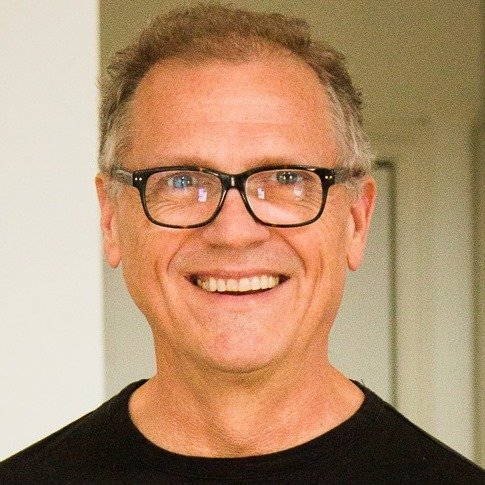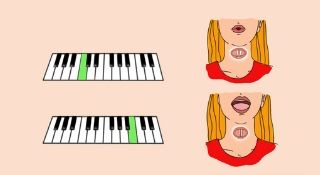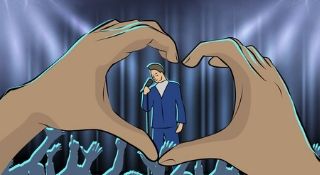"My Worst Audition Ever"
By Morgan Cryar
Everyone has an audition war story. Don't get hung up on the definition of an "official" audition. If you've every gotten up in front of a small group of strangers to perform, you've had an audition!
My war story is from 6th grade. It was the church youth talent show. I was a musical person but inexperienced. My friend Mitch and I had prepared a piano/guitar/vocal duet of the song "Proud Mary."
Backstage, my guitar fell down and untuned some of the strings. It didn't occur to me to check the tuning before getting up to do my thing.
The Secret To Star Singing
Click HERE For The Secret To Star Singing
The Secret To Star Singing
Click HERE For The Secret To Star Singing
I was mortified when I got onstage and heard the first nasty notes come from my guitar. But I was too intimidated to just stop the song, apologize, tune and continue.
I went through the whole song, shaking my head, and frowning at the awful sound.
That guitar was dungeoned in the closet for 4 years before I got over being mad at it! I "gave up music" for 4 years! But I eventually got over it, took out the guitar and started playing again.
Your war story probably came to mind as you read this.
And if you haven't given up forever, you might find yourself in another "audition" situation some day. I have many times.
I've
also found myself on the other side of the director's chair. I traveled
around the country doing a bi-monthly talent search for several years.
I've seen thousands of performers get up to take that "one shot." I've
seen good, bad, and awful.
What's strange is that most of the time, what made a performer "good" had more to do with their mind-set than the sounds they were producing.
I'm writing this because performance is a very human-to-human, intense "conversation." And an audition is even more intense.
5 Things You Must Know About Auditions
Thing #1: It's NEVER *your* audition.
Yeah, that's the first thing to get through your head. The people who called the audition think it's THEIRS!
They have a purpose that doesn't really have much to do with YOUR purpose.
Think about it.
They
have a role to get filled. They don't show up liking or hating or even
noticing you and your ambitions. They have ambitions of their own. They
want to put on the best show in town...or put together the hottest
band...or whatever.
If you want to reach YOUR ambition, you better show up determined to try to help them reach THEIR ambition.
Think like a director. As I said, I've been on both sides of the desk so I know it's hard to think your way around to the other side. But I highly recommend you try!
DON'T show up thinking "I hope they like me...I hope they like me...I hope they like me..." It shows up as insecurity right on your face.
Instead, show up thinking "How can I make this show be a better event for the audience. What contribution can my talent add to this show." That will show up as confidence.
Now you can't get up there and SAY that..."I'm here to make your show a better show." You just have to ask YOURSELF how your talent will make a better show. Then SHOW them what you have...you have to "bring it."
Thing #2: You have 3 seconds.
Auditions are really the most cruel "survival of the fittest" settings known to man. Because it's NOT about you, a director and his team won't hesitate to stop you in mid-measure and say "thanks, but no thanks."
He's got a number of people to hear and he values his time. It's nothing personal (I say that, but I have been in long auditions where I began to resent the endless stream of singers because of my fatigue. At that point, it FEELS personal.)
A director has trained himself to DISQUALIFY as quickly as he can...just to save time. So if a person is NOT what he's looking for, he usually knows it within a few seconds.
If he likes your first 3 seconds, you've bought yourself another 15 seconds. (A director won't literally stop you at 3 seconds...he'll usually give everyone at least 20-30 seconds before stopping them. But he will have made his decision to stop you normally within the first few seconds.)
So, practically speaking, think of the first 3 seconds that you are even in sight of the director as the "audition for the audition." You gain permission to continue.
That means just your walk onto the stage may be the life or death of the audition. It would actually be worth video-taping your walk and working on it until you like it yourself.
By the way, whether it's an audition or a "real" performance, it's still the same. People in any audience make very quick judgements about a performer based on their walk, their smile, their posture, their eye contact, their clothing, their personal appearance, and THEN FINALLY THEIR VOICE!
The big difference between audition and "performance" is that you get more time to "grow on" an audience when your performance is more than a single song.
In an audition you must learn to "bring it" quickly.
Thing #3: You're not alone.
By this I mean, there are other performers going before and after you. In most auditions these days, you can easily become a face in a crowded schedule.
Hours upon hours of listening to different singers make the mind grow numb! I can tell you from being in the director's chair, that the singers begin to meld together in the mind of the listeners.
You must ask yourself this question: "Why (or better yet,"how") will they remember me after hearing another 100 singers in the next 4 hours?"
If you can't answer that question, chances are, neither can they.
Is it your smile? Is it your particular vocal tone? Is it your quiet confidence? Is it your un-selfishness on stage? Is it the way you "take charge" of the stage? Is it how you refuse to hold back?
This is not a question that should cause you to "try too hard." Instead, it should make you "take inventory" of your strengths and find an "edge" that sets you apart from all others. Delight in that difference. Swim in it.
In marketing terms, this is called your "USP" (your "unique selling proposition"). What is it about you that is unique and is valuable to others. Finding out what that is can be very worthwhile.
A group of good, honest friends is where this information can be found. They can often tell you your unique strengths. It's part of what they enjoy about being your friend!
Thing #4: There's no excuse for you!
If for some reason you don't "deliver the goods" vocally, no director, (or even an audience), will make an excuse for it. It's not that they are cruel. It's just that every person has their own reasons for being present.
THEY came to have SOMEONE'S voice move them. If yours doesn't move them, they don't want to hear an excuse...they just want to hear the next person, in hopes that THEIR voice will move them.
The best way you can get to understand this is to go to 10-20 concerts within a short time. Go to a mix of successful and unsuccessful artists. Watch how they handle themselves on stage. Notice what moves you. But most of all...
Notice what happens IN YOU as an audience member.
Imagine yourself on the stage thinking the things you think when you're on stage. Now switch back to an audience member. Notice how you carry expectations when you are in an audience.
Notice how your expectations are not cruel, but they are not prone to make excuses for a poor performer. This kind of "thinking work" is very helpful to you as a performer.
Do it ASAP! No excuses.
Thing #5: You don't become a failure until you stop
showing up.
You wouldn't believe how many singers go to one audition and then give up. (Hey, that's what happened to me, remember?)
Imagine if you approached everything with that attitude. You'd still not know how to ride a bike. You'd still not know how to swim. You wouldn't know how to drive a car.
Heck, you'd probably not even be walking! I can't even count how many times my kids fell down before finally succeeding at walking.
It's not over until YOU'RE over. When you are turned down for an audition, here's what to do:
First, take a little time to recover from the pain.
Then, once you feel up to it, go through your performance and coach yourself (or better yet, get some coaching) on how you might improve next time.
The reason people get outside coaching is not because they don't know what to do (they DO know what to do)...It's because they already know what to do. They just aren't doing it!
Coaches make us do what we already know to do.
After finding possible improvements, practice them over and over. Get to where you can perform on autopilot.
That's when you'll begin to CREATE! You'll embellish and make the song your own. DON'T SKIP THIS STEP. AND DON'T GIVE UP.
Oh, and by the way, if your guitar ever falls down backstage, stop and tune it again before performing.
They say if you fall off the horse, you should get back on the horse again as soon as you can. I agree.
Blessings on your singing,
Morgan Cryar
About The Author
 Morgan Cryar - Songwriter Morgan Cryar - Songwriter |
Morgan Cryar is a contemporary Christian music vocalist, songwriter, and producer from Louisiana. His fourth album, Kingdom Upside Down reached 27 of the Billboard Christian charts. This album included the single Father, which hit number 1. |








